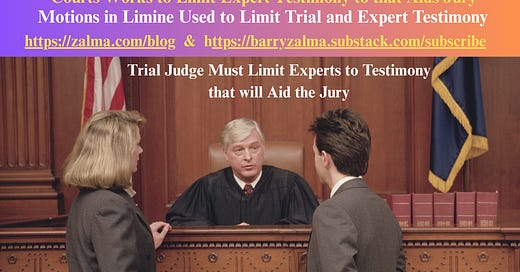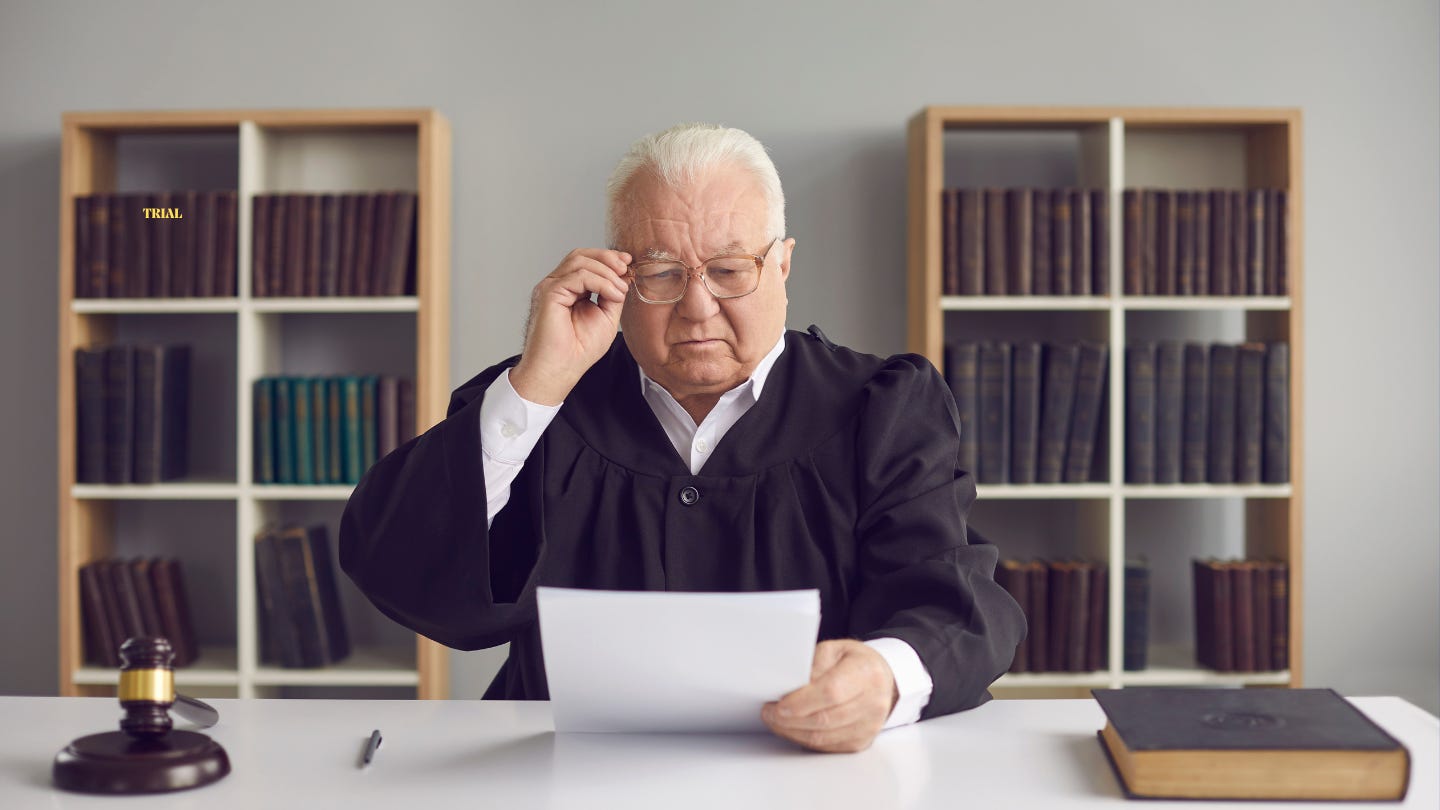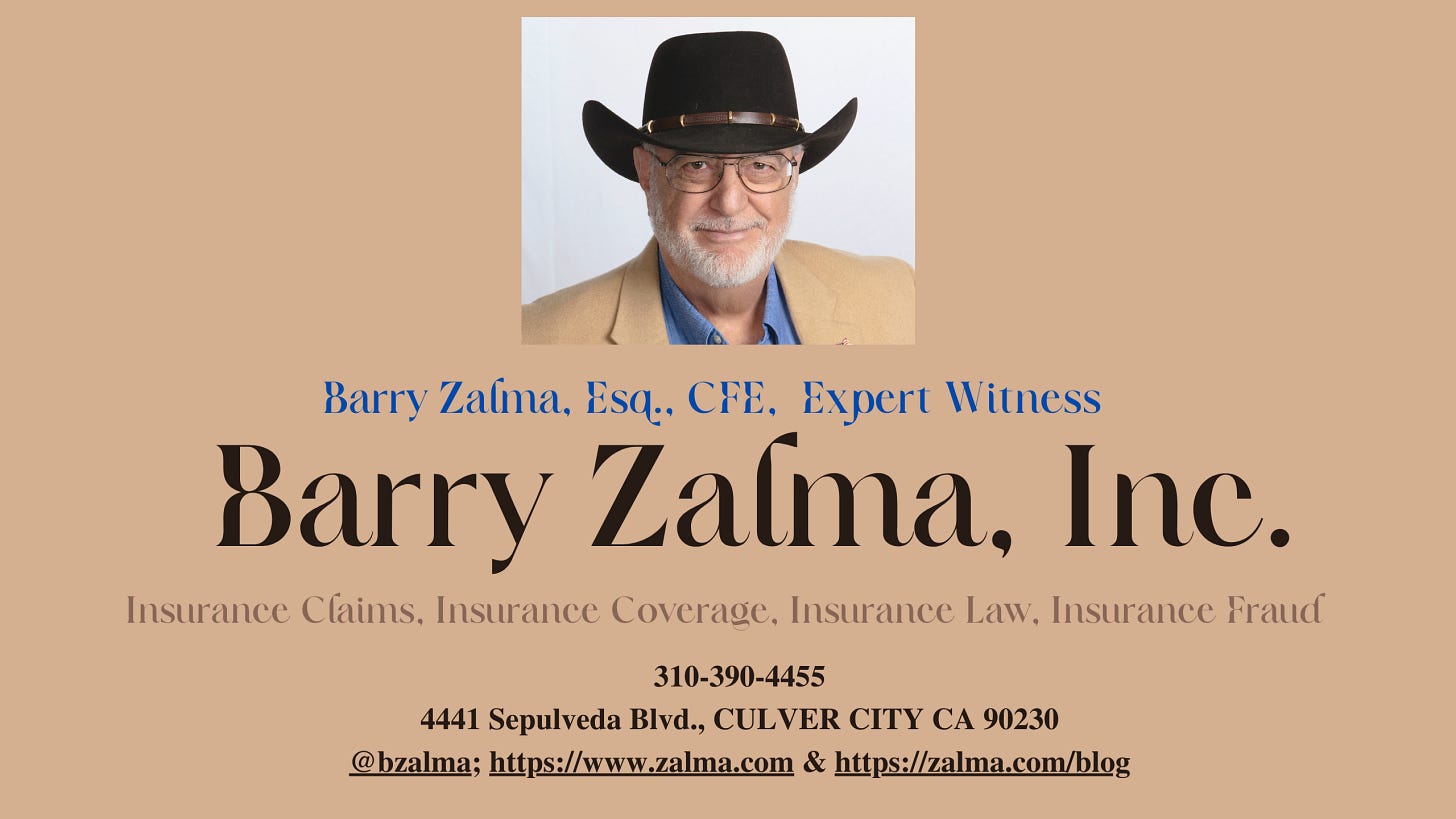Courts Works to Limit Expert Testimony to that Aids Jury
Motions in Limine Used to Limit Trial and Expert Testimony
If you are not a subscriber you’re reading the free version of Excellence in Claims Handling and should consider joining as a paid member to get full access to our news, analysis, insurance coverage, claims, insurance fraud and insurance webinars, by clicking at the subscribe button above.
Post 5116
See the full video at https://lnkd.in/ghvqp4Qi and at https://lnkd.in/gjsi8yGe and at https://zalma.com/blog plus more than 5100 posts.
Trial Judge Must Limit Experts to Testimony that will Aid the Jury
The case brought by Plaintiff Gary Cawley and others against American Financial Security Life Insurance Company and others was before United States District Court for the District of Arizona’s Honorable Steven P. Logan, United States District Judge.
In Gary Cawley, et al. v. American Financial Security Life Insurance Company, et al., No. CV-22-00823-PHX-SPL, United States District Court, D. Arizona (July 2, 2025) Judge Logan resolved dozens of motions in limine filed by the parties.
Motions in Limine
Judge Logan issued orders relating to various motions in limine filed by both Plaintiffs and Defendant recognizing that a motion in limine is a procedural mechanism to limit testimony or evidence in a particular area and the practice has developed pursuant to the district court’s inherent authority to manage the course of trials. A ruling on a motion in limine is essentially a preliminary opinion that falls entirely within the discretion of the district court.
This report is limited to the court’s ruling about defendant’s expert witness Christopher Martin.
The Court Ruled Plaintiffs’ Motion in Limine Number 5
Plaintiffs argued that the obviousness of warnings is an issue that a juror can readily determine from a lay perspective without the need for expert testimony. The Court agreed with the Defendant’s response that testimony about customs and practices in the insurance industry with respect to the use of disclaimers, including what is considered a “conspicuous disclaimer” pursuant to industry standards, is appropriate expert testimony. Therefore, the motion was denied, allowing Christopher Martin to testify about industry standards for conspicuous disclaimers in the health insurance industry.
Plaintiffs’ Motion in Limine No. 6
Plaintiffs requested to preclude Christopher Martin from testifying about the legal status of the relationship between the individuals who sold the subject short-term health insurance plan with which Judge Logan agreed. The law is the sole province of the judge.
Plaintiffs’ Motion in Limine No. 7
Plaintiffs moved the court to preclude Christopher Martin from testifying about whether Plaintiffs’ expectations of coverage under the subject short-term health insurance plan were reasonable. Whether Plaintiffs had a reasonable expectation of coverage is a factual question for the jury, which will not be aided by the testimony of either party’s expert. Therefore, the motion was granted, preventing Christopher Martin from offering opinions about the reasonableness of Plaintiffs’ expectations.
Plaintiffs’ Motion in Limine No. 8
Plaintiffs sought to preclude Christopher Martin from testifying about the reasonableness of consumers’ conduct, including the Plaintiffs’ conduct, when purchasing insurance. The motion was granted, preventing Christopher Martin from opining on the reasonableness of the Plaintiffs actions
Federal Rule of Evidence 702
Federal Rule of Evidence (“FRE”) 702 permits parties to file motions to exclude to ensure the relevance and reliability of expert testimony. FRE 702 provides that: A witness who is qualified as an expert by knowledge, skill, experience, training, or education may testify in the form of an opinion or otherwise if the proponent demonstrates to the court that it is more likely than not that: (a) the expert’s scientific, technical, or other specialized knowledge will help the trier of fact to understand the evidence or to determine a fact in issue; (b) the testimony is based on sufficient facts or data; (c) the testimony is the product of reliable principles and methods; and (d) the expert’s opinion reflects a reliable application of the principles and methods to the facts of the case.
The Court has a gatekeeping duty under the SCOTUS Daubert decision and Rule 702 to ensure that expert testimony will assist the trier of fact. The general test regarding the admissibility of expert testimony is whether the jury can receive appreciable help from such testimony.
ZALMA OPINION
Because juries and judges have little experience or knowledge about the custom and practice of the insurance industry expert witnesses are essential to aid the jury and the trial judge better understand the custom and practice of the insurance industry. I have served as an expert witness on insurance litigation and am careful to limit my testimony to the custom and practice of the industry garnered from my 58 years of experience in the field. The motions in limine were designed to limit the testimony of the experts to testimony designed to help the jury and judge understand the custom of the industry to properly rule on the claims and defenses of the parties.
(c) 2025 Barry Zalma & ClaimSchool, Inc.
Please tell your friends and colleagues about this blog and the videos and let them subscribe to the blog and the videos.
Subscribe to my substack at https://barryzalma.substack.com/subscribe
Go to X @bzalma; Go to Barry Zalma videos at Rumble.com at https://rumble.com/account/content?type=all; Go to Barry Zalma on YouTube- https://www.youtube.com/channel/UCysiZklEtxZsSF9DfC0Expg; Go to the Insurance Claims Library – https://lnkd.in/gwEYk.







